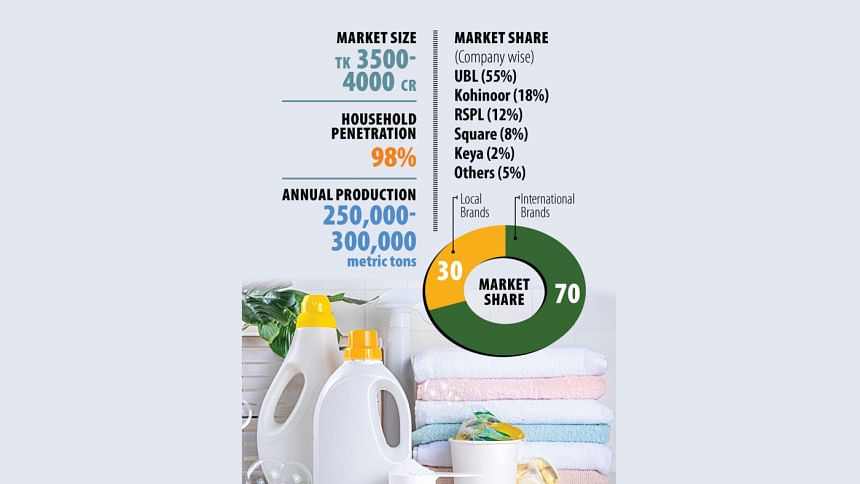The Transformation of Bangladesh’s Detergent Market

The evolution of detergents in Bangladesh has been remarkable, transforming the way people approach laundry by providing convenient solutions that ensure the careful washing of clothes while maintaining fabric quality. In earlier times, soaps were the primary cleaning agents, requiring significant effort and making the chore of washing clothes a laborious task. Today, however, detergents offer a more efficient alternative, greatly enhancing the user experience with their ease of application.
As Bangladesh transitions into a middle-income nation, there has been a notable surge in clothing consumption, with people increasingly opting for vibrant and colorful garments, in contrast to the past when predominantly white clothing was the norm. This shift has led to a heightened demand for convenient and frequent washing solutions, effectively positioning powder detergents as a revolutionary force within the laundry industry.
"Unilever celebrated 50 years in the laundry business a couple of years ago, having begun its journey in 1972 with Wheel Laundry Soap.
Over the past half-century, Unilever has been at the forefront of category evolution, pioneering market development from soaps in the 1970s and 1980s to detergent powders in the 1990s, and now introducing liquid detergents to Bangladeshi consumers," explains Md. Shadman Sadikin, the Marketing Director for Homecare at Unilever Bangladesh Limited.
The prolonged summer heat and escalating pollution levels in urban areas have further spurred demand for detergents. As vital everyday products, the detergent market boasts an annual value ranging between Taka 3,500 to 4,000 crore.
"As the population continues to grow, so does the demand for laundry services, providing a significant boost to the detergent powder industry. While some consumers still rely on traditional ball cloth soap for tackling tough stains, detergent powder has become the preferred choice for regular washes. Moreover, in urban settings, liquid detergents are gaining popularity, particularly among those who use washing machines, as they are regarded as more compatible with machine washing," states Fazal Mahmud Roni, Head of Marketing at Radiant Care.
At present, both multinational and local companies play a significant role in the detergent market in Bangladesh, expecting ongoing growth as they provide simplified solutions for daily laundry—an essential yet labor-intensive household task.

A significant transfor-mation in the laundry landscape has been the shift from bar soap to detergent powder in households. Industry insiders indicate that detergent powders now account for over 95 percent of household usage, owing to their user-friendly and convenient attributes. This trend is further evolving, with liquid detergents gaining traction as they steadily replace traditional powder options in the market.
The rise of liquid detergents can largely be attributed to the increasing prevalence of washing machines in urban areas, where they are not only preferred for machine washing but are also becoming popular for hand washing due to their gentler formulations and ease of use. Liquid detergents offer enhanced cleaning power while being softer on fabrics, catering to the diverse needs of consumers.
This growing reliance on detergents has been particularly beneficial for women, who have traditionally shouldered the burden of laundry tasks in households. The advent of detergents with health-conscious formulations and innovative cleaning mechanisms for stubborn stains has greatly alleviated this burden. Many products now feature eco-friendly ingredients, appealing to a rising awareness of sustainability and personal health. Additionally, the convenience of pre-measured liquid pods and easy-dispensing bottles simplifies the laundry process, making it more accessible and less time-consuming. This shift not only reflects changing consumer preferences but also signifies a broader movement towards more efficient and effective cleaning solutions in everyday life.
On the production side, the ingredients used in powder detergents have historically been primarily imported, particularly the key ingredient LABSA (Linear Alkyl Benzene Sulfonic Acid). Recent global price increases for raw materials have pressured companies to find ways to maintain affordability for consumers. In response, many manufacturers are implementing gradual price adjustments to keep the market vibrant and competitive.
However, the landscape is changing. Over the past year and a half, several local companies, such as United Group and Liberty, have begun producing LABSA domestically, effectively meeting the entire local demand, shares Md. Quamrul Hassan, Business Director of ACI Consumer Brands.
This shift towards local production not only helps reduce reliance on imports but also supports the growth of the domestic chemical industry, potentially leading to more stable pricing and availability, shares
Despite these positive developments, there are concerning practices within the market. Some unrecognized companies produce detergents without adhering to Bangladesh Standards and Testing Institution (BSTI) regulations, resulting in the proliferation of low-quality products that can pose significant health risks. These products sometimes mimic well-known brands, misleading consumers and further complicating the market landscape. Industry insiders are advocating for stricter oversight and regulatory enforcement to protect public health and ensure that consumers receive safe, effective products. Strengthening quality control measures and increasing awareness among consumers about identifying reputable brands can help mitigate these issues and foster a healthier market environment.

 For all latest news, follow The Daily Star's Google News channel.
For all latest news, follow The Daily Star's Google News channel. 



Comments